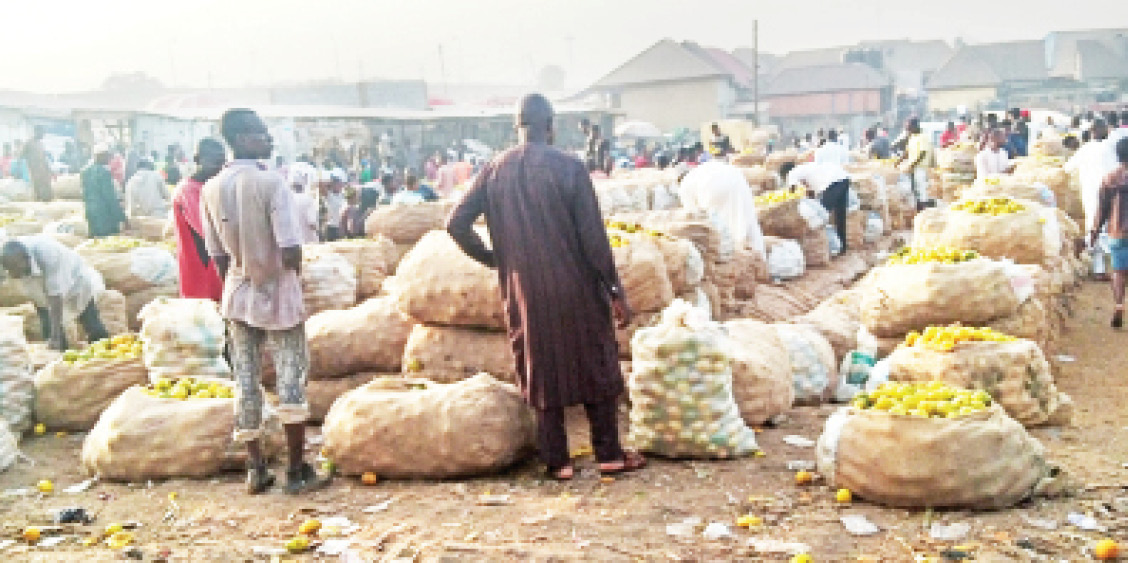Why Zuba fruit market needs urgent intervention
For traders and farmers of fruits and vegetables in the country, the Zuba ‘international’ market, as it is called, is a major selling hub. The market serves not only the Federal Capital Territory (FCT) but neighbouring states as well. No doubt, the market is a source of income for thousands of people, mostly women and […]

The orange section
For traders and farmers of fruits and vegetables in the country, the Zuba ‘international’ market, as it is called, is a major selling hub. The market serves not only the Federal Capital Territory (FCT) but neighbouring states as well.
No doubt, the market is a source of income for thousands of people, mostly women and young ones trading in fresh produce in and around Abuja, the nation’s capital.
Hundreds of tonnes of fruits like oranges, pawpaw, banana, plantain, pineapple, coconut, watermelon and others, as well as vegetables, make it to the market daily.
Our reporter who visited the market on Tuesday witnessed increased activities around imported apple and coconut businesses as a major wholesale ground for retailers.
Over 70 per cent of the fruits consumed in the FCT and neighbouring states come from this market, where thousands congregate as early as 5am every day to do business.

However, despite the huge potentials of the market to strengthen the horticultural business locally and internationally, there are challenges that have remained for many years.
The market is still very much unorganized, and the fruits are mostly placed on dirty grounds, raising serious public health concern, especially as the country joins the rest of the world to combat the COVID-19 pandemic.
Also, fresh fruits share common ground with rotten ones and wastages that are already infested with germs and diseases. Dusts from thousands of legs walking around the filthy environment also expose many people to germs, making them vulnerable to diseases.
Again, the absence of necessary infrastructures like cold rooms, good road network, water, standard shops, clean ground facilities for placing fruits, and a host of other factors heighten major safety concern and place everyone eating fruits in Abuja and its environs at high risk.
But despite these challenges, activities in the market put money in the pockets of many and generate revenue for the government too.
Our reporter spoke to a number of farmers and dealers who have been doing business in the area for many years.
Tarsoo Alex, who has orange orchards in Vandikya, Benue State, said he supplied over 60 bags of oranges to the market on Tuesday. But he lost about five bags to excessive heat, occasioned by scorching sun. He was afraid that if buyers did not come early, he could lose more.
According to him, a bag of oranges costs between N6,000 and N7,500, but his income is significantly reduced by huge cost of transportation from his farm in Benue to Zuba.
To address the issue of wastages, he said many of the farmers were embracing jute bags, which allow air to penetrate instead of polythene bags that generate excessive heat for the fruits.
Unlike oranges, plantains are everywhere now because this is its season, a young man who preferred to be simply called Pastor told our reporter. He said that before noon, all the plantains would have been bought. He helps farmers to sell their produce.
It is usually sold in dozens (12 bunches), which cost between N5,000 and N8,000, depending on the size of the bunches on each unit of 12.
Watermelons are sorted as grades 1, 2 and 3, with 50 pieces in each dozen. Their prices also depend on grades, with the least costing as low as N9,000. Regular customers can get lower prices.
The same selling pattern goes for pawpaw and pineapples, but coconut is sold in bags while apples are graded and sold in cartons.
In 2018, Daily Trust on Sunday uncovered a massive use of carbide to ripen fruits in the market, which health experts said could cause cancer. The report eventually led to a crackdown on perpetrators by the market union leaders through their task force.
Our reporter observed a significant improvement as the chemical is no longer seen to be used as was the previous practice. But there’s the need to protect the health of consumers who patronise the market.
